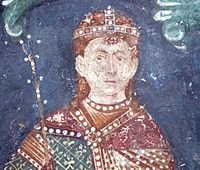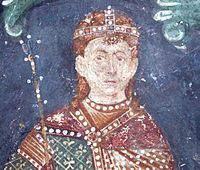Life of Konstantin, who may even be canonized in Middle Ages, was obscured even in medieval chronicles while today is almost completely forgotten. Nearly all data on him are approximate and has to be extrapolated from other biographies. Apparently not much valued by his contemporaries, even by his own father who appointed him a successor only when had no other options, he met a cruel death by the hand of his own brother, losing the throne to which he lawfully succeeded.
Life of Konstantin, who may even be canonized in Middle Ages, was obscured even in medieval chronicles while today is almost completely forgotten. Nearly all data on him are approximate and has to be extrapolated from other biographies. Apparently not much valued by his contemporaries, even by his own father who appointed him a successor only when had no other options, he met a cruel death by the hand of his own brother, losing the throne to which he lawfully succeeded.
Family Members
Advertisement
Advertisement





